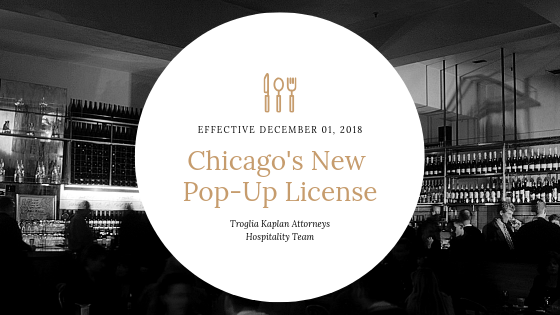Chicago’s New Pop-Up License
On December 1st, 2018, Chicago began offering a new business license aptly called a “Pop-Up License”. A Pop-Up License allows restauranteurs and entrepreneurs to test their concepts without the burden, and risk, of signing a long-term lease or acquiring a license. The license is broken down into two categories; Pop-Up Users and Pop-Up Hosts. The Pop-Up Users are those who wish to test their business ideas in different locations around the city while the Pop-Up Hosts are those who are allowed to host Pop-Up Users. Below I will breakdown the requirements and basic licensing that one will need to be either a Pop-Up Host or Pop-Up User.
Pop-Up Users
There are four different categories of Pop-Up User licenses; retail users (formerly known as “Itinerant Merchants”) Tier I food establishments, Tier II establishments, and Tier III food establishments. To acquire a Pop-Up retail user license one first needs to acquire a business license. After acquiring a business license a proprietor can apply for a 5-day, 30-day, 90-day, 180-day, or 1-year license. After acquiring the license a retail Pop-Up User may Pop-Up in any non-manufacturing and non-residential location.
Tier I-III Pop-Up Food Establishment licenses are a bit more difficult to acquire. A Tier I license can be acquired for someone wishing to sell nonperishable food that is already commercially prepackaged before being sold at the Pop-Up location. A Tier II license authorizes a the license holder to sell or serve, in any combination, perishable, nonperishable, hot or cold prepackaged food that has been prepared, packaged and stored off-site at a shared kitchen or a retail food establishment. A holder of a Tier II license may have minimal assembly onsite (e.g. tossing a prepackaged salad) but the key word is minimal.
A Tier III holder may sell or serve, in any combination, perishable, nonperishable, hot or cold food prepared on-site at the actual Pop-Up location. The holder of a Tier III license is authorized to operate as a full-service restaurant. Liquor cannot be sold by the Pop-Up user but it can however be sold by the host or BYOB can be utilized for patrons. One final sticking point it that Tier II or Tier III Pop-Up users may not operate at the same location for a period in excess of 90 days within any 365-day period.
Pop-Up Hosts
Pop-Up hosts are divided into two tiers based on the type of food activity occurring on the premises. Tier II Hosts are allowed to host Tier I and Tier II license holders to operate at their location. A Tier II Host who plans on hosting Tier II Pop-Up food establishments must equip their location with a hand sink, sufficient time/temperature control equipment to ensure the safety of heated or refrigerated foods, and acquire such equipment as to conform with the Department of Health Food Code Rules. Tier II Hosts, as well as Tier III Hosts, are also directly responsible for ensuring no Pop-Up food establishments operate at their location for a period in excess of 90 days within any 365-day period.
A Tier III Host license authorizes the host to allow Tier I, II, or II license holders to operate at their location. Their location will require an inspection and must have all equipment required in restaurants to conform with the Department of Health Food Code Rules. A Tier III Host, as well as Tier II Hosts, may have a liquor license allowing them to serve to customers of the food establishments, as well as allowing BYOB. The workers of the Hosts must be the ones selling the alcohol however to conform with the Department of Business Affairs regulations regarding liquor licenses.
Pop-Up licenses allow for greater entrepreneurship and are thus, in this lawyer’s opinion, a benefit for the City of Chicago. Restaurant owners, or simply amateur chefs, wanting to test new concepts will have found a friend in Pop Up licenses. Additionally, this allows property owners to utilize their space to its fullest extent. One must still be in conformity with the zoning and health regulations of Chicago, which Troglia•Kaplan can help you navigate, but the licenses are still not all too difficult to acquire, compared to the cumbersome task of getting a retail food license. Contact us if you have any more questions regarding Pop-Up licenses, or simply questions about restaurant/tavern licensing or regulations.

